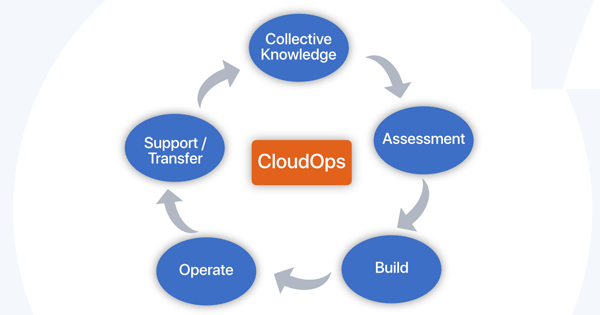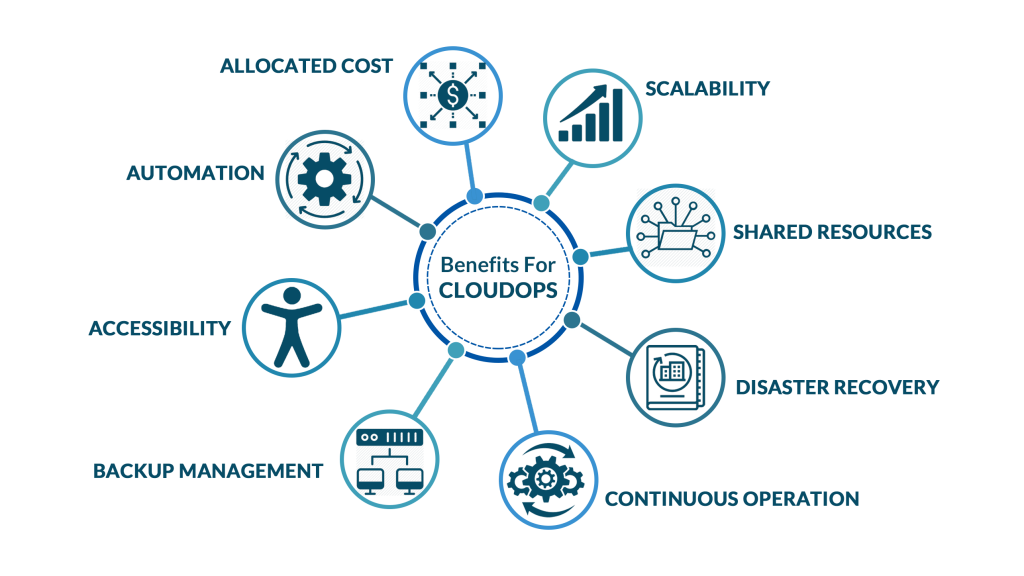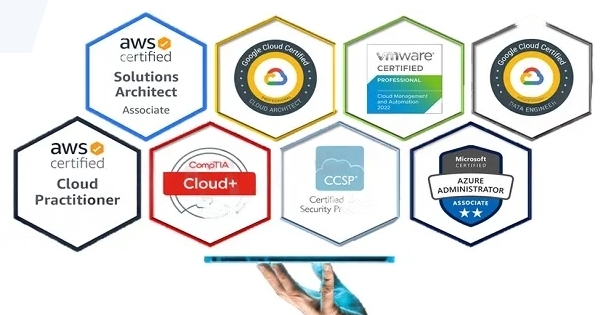
Welcome to our comprehensive guide on Cloud Operations (CloudOps). This tutorial is your portal to understanding the significance of CloudOps, implementing essential best practices, and discovering the ideal certification courses to elevate your career. In this guide, we will explore the world of CloudOps, including its importance, core best practices, and a curated selection of top certification courses. Join us on this exciting journey into the realm of Cloud Operations!
CloudOps, short for Cloud Operations, encompasses a suite of practices and procedures dedicated to the management and optimization of cloud-based services. These activities encompass provisioning, monitoring, scaling, and troubleshooting cloud resources, as well as ensuring the security, compliance, and performance of cloud-based applications and workloads.
Why is CloudOps important?

CloudOps, an abbreviation for Cloud Operations, entails the art of efficiently managing and optimizing cloud infrastructure and applications to guarantee effectiveness, security, and scalability. As more businesses are embracing cloud migration, the mastery of CloudOps has emerged as an indispensable skill. The following outlines the reasons why:
- Enhance agility and responsiveness: CloudOps empowers organizations to efficiently adjust their resource allocation, enabling them to swiftly adapt to evolving business requirements.
- Cost Reduction: CloudOps aids organizations in cost reduction by optimizing resource utilization and eliminating inefficiencies.
- Enhance Security and Compliance: CloudOps encompasses a range of security and compliance functionalities that enable organizations to safeguard their data and fulfill regulatory obligations.
- Boost Performance and Reliability: CloudOps aids organizations in enhancing the performance and reliability of their cloud-based applications and workloads through the monitoring and management of critical metrics like uptime, response time, and resource utilization.
Optimal Approaches in Cloud Operations
Here are several recommended practices for Cloud Operations (CloudOps):
- Leverage Automation Whenever Possible: Automation plays a pivotal role in reducing errors and enhancing operational efficiency.
- Utilize Monitoring Tools for Key Metrics: Employ monitoring tools to keep a close eye on essential metrics. They enable early identification and resolution of potential issues before they can lead to outages or performance degradation.
- Prioritize Security Measures: Implement vital security measures such as encryption, access controls, and intrusion detection systems to safeguard your cloud-based resources effectively.
- Craft a Comprehensive Disaster Recovery Plan: Develop a disaster recovery plan that ensures minimal downtime and data loss in the face of unforeseen disasters.
- Regularly Evaluate and Update CloudOps Practices: Recognize that CloudOps is a continually evolving field. Regularly assess and enhance your practices to stay aligned with the latest tools and technologies, ensuring you always utilize the best available resources.
What Are the Advantages of Cloud Operations (CloudOps) Training?

There are numerous advantages to Cloud Operations (CloudOps) training, such as:
- Increased Career Opportunities: The CloudOps field is experiencing rapid growth, leading to a high demand for skilled CloudOps professionals. Acquiring CloudOps training can significantly enhance your prospects of securing a job in this thriving sector.
- Competitive Compensation: CloudOps engineers are sought after, often commanding competitive salaries due to their specialized skills.
- Expanded Skillset and Knowledge: CloudOps training equips you with the essential skills and knowledge required for efficient management and optimization of cloud-based services. This expertise is valuable across various IT roles.
- Career Progression: CloudOps training can propel your IT career forward. It opens doors to senior positions and higher earning potential.
- Job Satisfaction: CloudOps engineers frequently find their roles fulfilling as they work with cutting-edge technology, aiding organizations in maximizing their investments in the cloud.
Moreover, Cloud Operations (CloudOps) training can also assist you in:
- Stay Updated on the Latest Cloud Technologies: CloudOps training ensures you are well-versed in the most recent cloud technologies and trends, keeping you at the forefront of your career.
- Build a Network of CloudOps Professionals: Enrolling in CloudOps training courses presents an opportunity to connect with fellow CloudOps professionals. This network can serve as a valuable resource for knowledge exchange and potential career prospects.
- Prepare for CloudOps Certifications: Many CloudOps training programs prepare students for CloudOps certifications like the AWS Certified DevOps Engineer – Professional exam. Achieving such certifications can effectively showcase your skills and knowledge to potential employers.
In summary, CloudOps training is an excellent means to enhance your expertise, expand job prospects, and advance your IT career.
Leading Courses for Cloud Operations (CloudOps) Certification

Selecting the appropriate certification can markedly improve your Cloud Operations (CloudOps) abilities and career opportunities. Below are some recommended courses to explore:
Devopsschool, scmGalaxy, BestDevOps, and CloudOps.in training institute are all reputable training providers that offer CloudOps training.
These courses commonly offer training through the following methods:
- Online Courses: These courses are typically self-paced and accessible from anywhere with an internet connection. They typically incorporate video lectures, practical labs, and practice examinations.
- Instructor-Led Training (ILT): Instructor-led courses are generally conducted in a classroom environment under the guidance of a qualified instructor. These sessions typically feature lectures, discussions, and hands-on labs.
- Bootcamps: Bootcamps represent intensive and immersive training programs that usually span a few weeks. They are specifically designed to equip students with the skills and knowledge required to launch a career in CloudOps.
These training providers generally offer a range of Cloud Operations (CloudOps) courses, addressing various subjects such as:
- Cloud architecture
- Cloud deployment
- Cloud monitoring
- Cloud security
- Cloud cost optimization
- DevOps
Furthermore, certain training providers might also provide specialized courses tailored to specific industries or cloud platforms.
Let’s delve deeper into how each of the mentioned training providers delivers Cloud Operations (CloudOps) training:
- Devopsschool – Devopsschool provides a range of Cloud Operations (CloudOps) courses, available in both online and instructor-led formats. These courses are meticulously crafted to equip students with the essential skills and knowledge for effective management and optimization of cloud-based services. Additionally, Devopsschool offers a specialized CloudOps certification training program, specifically designed to prepare students for the AWS Certified DevOps Engineer – Professional examination.
- scmGalaxy – scmGalaxy provides an array of Cloud Operations (CloudOps) courses, available in both online and instructor-led formats. These courses are thoughtfully structured to impart students with the essential skills and knowledge required for the effective management and optimization of cloud-based services. Furthermore, scmGalaxy offers a dedicated CloudOps certification training program, tailored to equip students for the AWS Certified DevOps Engineer – Professional examination.
- BestDevOps – BestDevOps presents a range of Cloud Operations (CloudOps) courses, available in both online and instructor-led formats. These courses are thoughtfully crafted to impart students with the essential skills and knowledge necessary for the effective management and optimization of cloud-based services. Additionally, BestDevOps offers a specialized CloudOps certification training program, designed to prepare students for the AWS Certified DevOps Engineer – Professional examination.
- CloudOps.in – The CloudOps.in training institute provides a diverse array of Cloud Operations (CloudOps) courses, available in both online and instructor-led formats. These courses are meticulously structured to impart students with the essential skills and knowledge necessary for the proficient management and optimization of cloud-based services. Additionally, the CloudOps training institute offers a dedicated CloudOps certification training program, tailored to prepare students for the AWS Certified DevOps Engineer – Professional examination.
Which training provider suits your needs best?
The ideal training provider for you hinges on your unique requirements and preferences. If you favor self-paced learning, an online course could be the most suitable choice. Alternatively, if you prefer a classroom environment, an ILT course may align better with your preferences. For those seeking an intensive and immersive training experience, a bootcamp could be the optimal selection.
Additionally, it’s crucial to take into account the specific courses available from each training provider. Ensure that your chosen training provider offers the courses aligned with your interests and career objectives.
Digital Marketing Manager at Cotocus


